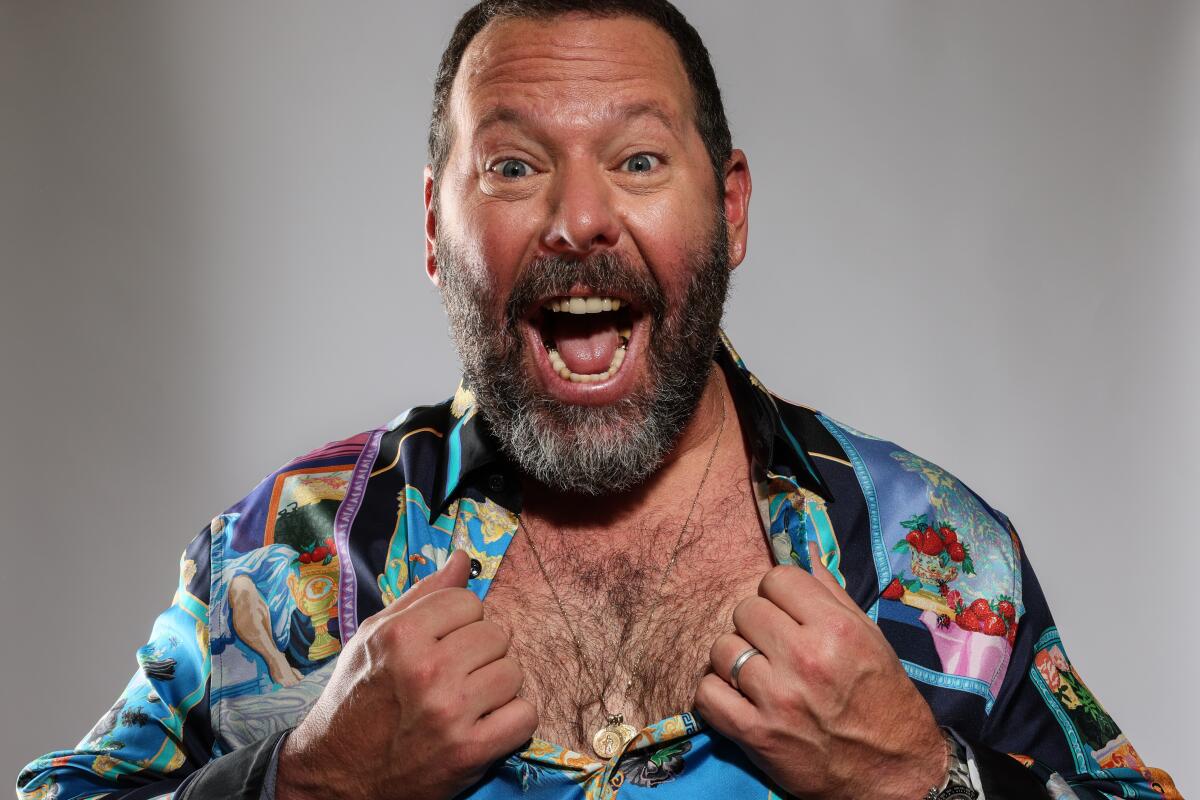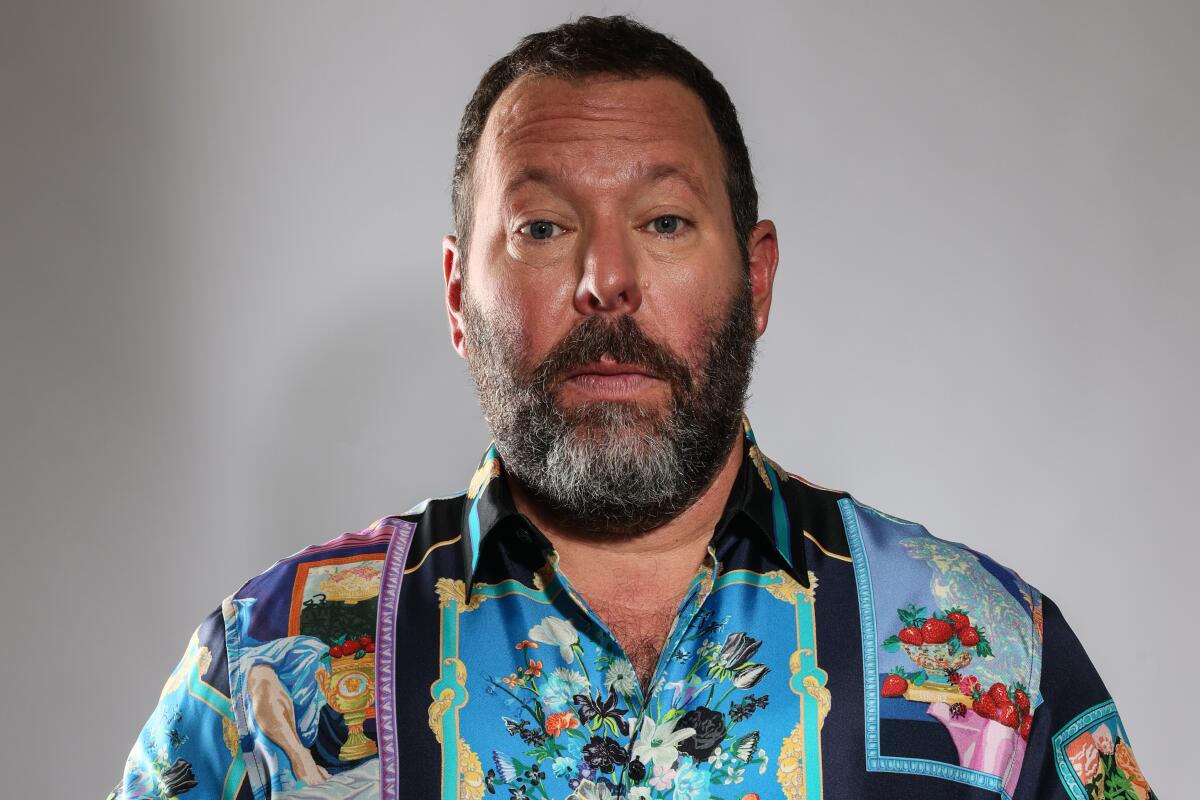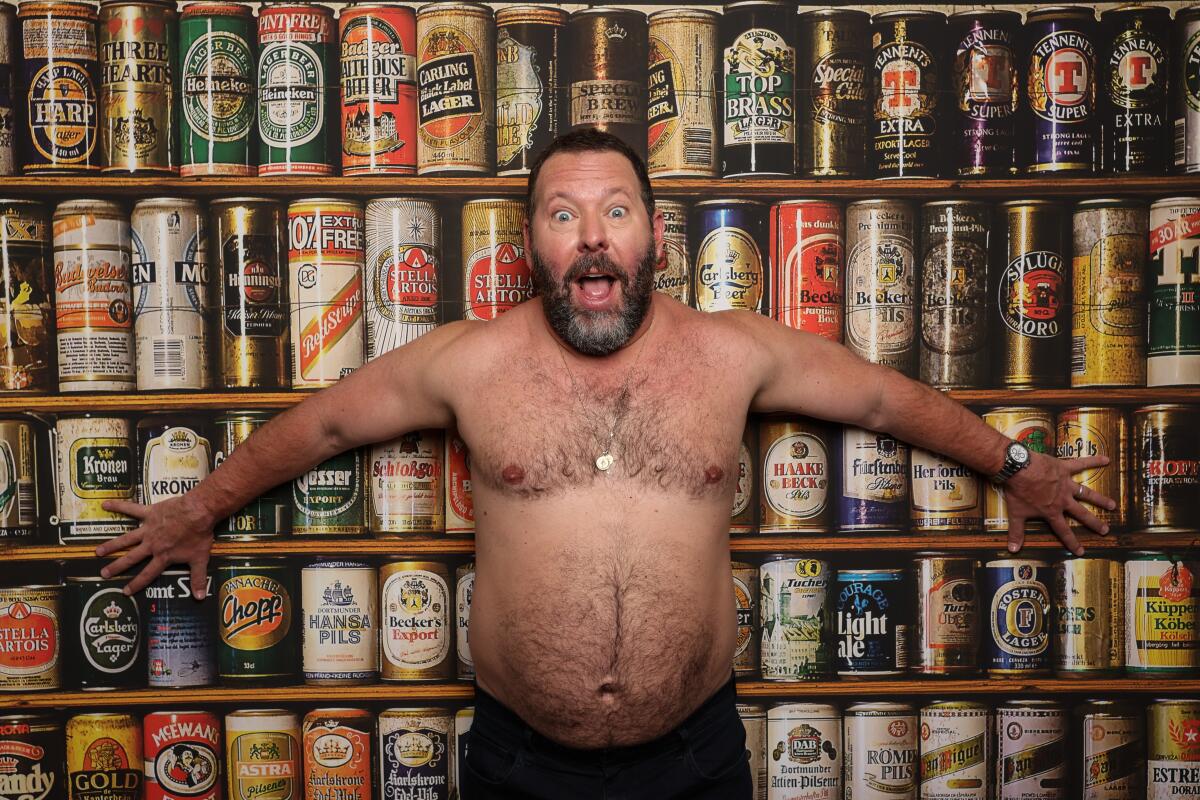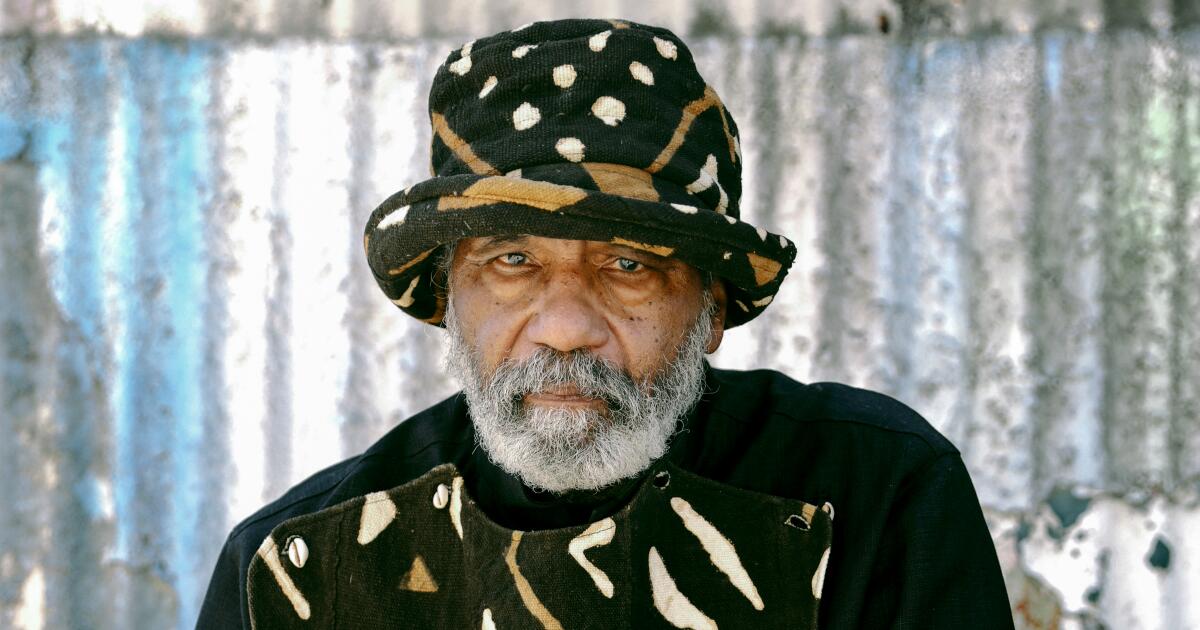Entertainment
Bert Kreischer shares his 'Lucky' secret to success in comedy. Hint: It has nothing to do with hard work

Luck is a religion for Bert Kreischer. Try sitting with him for more than a few minutes without it coming up in conversation — especially as it relates to comedy. Walking through the halls of his Sherman Oaks compound that houses Berty Boy Productions, he rattles off moments of good fortune in the careers of the world’s biggest comics like a sports stat guru who knows the game better than anyone else. Because, honestly, he does. And it’s not because he thinks he’s the funniest man to ever hold a microphone, though his shirtless razzle-dazzle and talent for hilarious, heartfelt storytelling has obviously created an empire. It’s because he is in a constant state of identifying the luck in his life, which he says is half the battle when it comes to success. No surprise then that “Lucky” is the name of his latest special premiering Tuesday on Netflix.
Recently The Times spoke with Kreischer about the value of luck over hard work, the smartest thing he did to retain audiences who stream his comedy and his desire to return to the fun and creativity he had in comedy before his career blew up.
In your special you once again come out onstage in all your shirtless glory — congrats on looking much more svelte these days.
Sadly I’m still morbidly to the obese. That’s the craziest thing about the body, the BMI scale. Have you ever looked at yourself will be on my scale? My first time I ever did it was a long time ago, on a podcast with Tom [Segura] and I were fat-shaming each other, and we were so morbidly obese. And even at my skinniest, I am still morbidly obese.
What is the key thing to help you stay motivated with physical fitness and staying healthy on tour or preparing for a special?
It’s gonna sound so stupid — but it’s partying. I only work out so I can party. I look at guys who party and don’t work out and that kind of bums me out, and I go, “Hey, man, not allowed to do that. That’s not the way it works.” Every dad I ever knew growing up, if they had beers, they were very active. Maybe they have drinks on a night and out, but in the morning they wake you up and go play basketball, or go fishing in the morning. My dad ran marathons. So I just, it got ingrained in me, if you’re gonna go out and have fun and party, then you’ve got to pay the tax in the morning. I’m still fat, and I work out really freaking hard — I just benched 325 pounds. But I’m still just doing it so I feel better about myself when I wake up in the morning and I’m like, “last night was a long night, but I’m gonna go work out.”
How has it been allowing those elements of your life to co-exist between partying, working hard with comedy, having a family, etc?
I got a canary in the mine, and that’s my wife [LeeAnn]. There’s been times where she’s been like, “a;l right, let’s pull it back.” Two years ago in July, she was like, “I think we’re gonna pump the brakes on this one.” And then I didn’t drink for like, three months, and I lost 55 pounds. But my wife’s the same person who, if I’m not drinking, and we’re in Italy, she’ll be like “Have a glass of wine. Don’t be a fool. We’re only in Venice once. It’s snowing, let’s have a drink. Have some champagne.” My wife won’t let me be a teetotaler and won’t let me be an alcoholic.

“I only work out so I can party,” Kreischer said. “I look at guys who party and don’t work out and that kind of bums me out, and I go, ‘Hey, man, not allowed to do that. That’s not the way it works.’”
(Robert Gauthier / Los Angeles Times)
You’ve got a lot of jokes about LeeAnn in this new special. When you write jokes about your wife, do you have to run them by her before you hit the stage?
No, I just write them. Because you gotta remember, I still just do stand-up the way I did it when I was a kid, where you just write the stuff and say it, and if it didn’t work with the audience, then you stop doing it. But if it works for the audience, then you’d figure out the tax on your family, and you’ll be like, are you guys cool with this? But you got to find out if it works first. So I just tried them all, and then she came and saw it a few times.
And there was a little bit of a process in this one, because I wrote the material on the road, and I told it so much, I was on such an aggressive tour, that I kind of lost the smile in it. And so that material specifically, if you can’t tell that I am joking, if you think that I’m mean, or if I lose the little, in her words, “the rascal” in it, then all of a sudden it’s mean jokes about women. But if you know that I’m a loving husband who adores his wife, then it’s OK. And [my wife], my producer, and my director were all like, “we just want to make sure we see the smile in it.” And so I think we, I know we achieved that in the special. My wife edited it, she edits all my specials top to bottom. I gotta be honest with you, I look at like the first five minutes, and then if I like the first five minutes, I watch the whole special. But the first five minutes is what I’m really specific about. Streaming is like grabbing their attention right away and saying “Don’t leave, don’t go anywhere. I know you have a million options. Don’t leave, don’t go anywhere.”
When it comes to retaining an audience, whether you’re touring or doing specials, has that changed a lot since you started comedy?
Oh, f— yes, you have no idea. There used to be a thing called a closer. A closer would be something you’d put at the end of your act because you were done, and then Netflix showed up. And now audiences decide your closer for you. If they were bored, they were done. And it turned out that the majority of specials only got about 30 minutes of viewing. One comic said to me, he goes, I actually can still tell my closer because no one watched the whole special, so I’m still using my closer on the road. And I had this great closer about zip lining with my wife, it was in [my special 2018 special] “Secret Time.” That’s like my favorite joke of my whole set. Why would I put it at 48 minutes and have it close out my special? Why wouldn’t I put it at 22 minutes, so that, if you’re telling me they’re only gonna watch 30 minutes, then I put it at 22 minutes and you just watch my closer. If you’ve just watched my closer, then you’re gonna watch the rest of the special.
We got the notes back from [my 2018 special] “Secret Time,” and Netflix was like “your rate of retention was through the roof! People that started your special, 95% of them watched the entire thing, and that had not never happened.” And literally, they brought us in for a meeting, and they’re like, “what did you do?” And I said, I talked to some comics who did specials here and no one watches their whole special. So I just put my closer at 22 minutes. Literally, Netflix said to me, “is it cool if we give your special to other comics?” And I was like, “yeah, tell them what I did.”
And so for this one, I had a really great joke that was like that. I think it’s the phone sex joke. That little chunk was really great. And it’s at four minutes and 20 seconds. And I’m like, nice, and I knew I had a closer that could go nowhere else but the end, a story about my dog that passed away. So I was like, “dude, that belongs at the end.”
That part was so emotional. Anyone who has ever had a pet can relate to that bit.
For that bit I think I was in Utah, I was in a place where men are men — it’s not like, not like L.A. or New York — they’re “men,” the country. They’re men who lift things, but don’t lift weights, like, just strong dudes. And I told the story about my dog and I saw dudes crying in the audience, and I was like, “well, that’s weird.” And then I got so much feedback [on social media]. They’re like, “Bert’s show is amazing. But that dog story, man that killed me, man it was hilarious, and we just put our dog down.” I just, that kind of stuff and stand-up, you know, some comics look for the edgiest stuff, or the stuff that like is gonna be clickbait. For me, I look for the stuff that kind of brings us together and makes us all feel the same or equally as good about our broken parts. And I just thought that was a good bit to include in the special.


Comedian Bert Kreischer. (Robert Gauthier / Los Angeles Times)
When you laugh at your own jokes it almost sounds like you’re crying — it’s like a specific type of laughter that makes every joke seem to hit harder.
What’s so funny is a long time ago at a meeting with William Shatner, he said to me, sitting on my couch like this, he goes, “Can you cry?” I said, “Yeah.” He said, “Can I see it?” I said, “Yeah.” So I started crying. And then I started giggling, because I was like, “I’m crying in front of William Shatner.” He’s like, “I love it. I love it.” If you ever cry, as a man, you go into the bathroom. because you don’t want anyone to see you. If you ever catch a reflection of you crying, you turn into your high school buddies real quick. You’re like, “what are you, a p—!” and when I cry, I giggle sometimes.
I’ve never met your daughters, but I feel like I have after watching this special — they sound hilarious in all of your stories about them. Do you see the comedian gene in them? Would you ever want them to move into the family business?
I don’t, because they’ve seen how the sausage is made. I mean, you gotta remember, everyone you see trending on Netflix, they call uncle — it’s different. But they also see how tough comedy can be on a person and as an occupation. So I don’t think they’d ever get into comedy. I wouldn’t even want it for them. My daughter’s best friend, Daisy, that’s who I want to make a comedian. She’s funny as s—, and she doesn’t know she’s funny. Me and Whitney [Cummings] wrote an act for Daisy on the road. I’m like, “Daisy, just try stand-up.” She goes, “it’s 20,000 people. People don’t do stand-up for the first time in front of 20,000 people!”
The title of the special “Lucky” feels self-explanatory given the life that you lead, at least the life people see. But what made you want to make that the name of your special?
I believe in luck more than I do hard work. I really sincerely do. I had a moment in my career where I had to be resigned to the fact that I may just be a journeyman comic, that I may just be a guy who always does shows at Funny Bones and Improvs. And I was cool with that. I was very cool with that. I may never make more than, you know, $5,000 on a weekend. … So I was resigned to the fact that I may never be the person everyone runs into the room to go watch do stand-up, I may not be the guy that gets specials. I may have to do a workaround. I may have to work a little different to get the fans that I need to make the living and to keep my family above board.
And then my Machine story went viral, and one of my best friends [Joe Rogan] happened to become the biggest media personality in the world, and my other best friend [Segura] decided we should start a podcast. Now, all of a sudden, my podcast is blowing up. That’s luck, man. Everyone works hard. But sometimes you get lucky. If you look at my life, I’m the luckiest motherf— you’ll ever meet. I also believe that if you identify the luck in your life, you just start feeling lucky. Those dudes who are like, “man, I can’t catch a break,” it’s just like, stop. Start thinking of all this is luck.
For you it seems the next step has been keeping all your success going. Obviously you have your wife’s help with all that. But do you think about how to carry that into the future and how you want to continue to grow your empire?
You know what’s so funny — no. I’m actually trying to think how to go backwards a little bit into more fun creative play. I got so overwhelmed in the media company landscape of brand deals and producing other people’s specials and producing other podcasts and building and trying to keep all the plates spinning, that part of me was missing. LeeAnn said this to me: “I miss the days when you would come up with a promo idea and we would shoot it as a family, and it was so fun.” And that is what I’m trying to get back to — that fun. The fun in the early part of comedy, the fun in creating stuff, the fun in making stuff. What’s the point of a media company if it’s not fun?

Comedian Bert Kreischer.
(Robert Gauthier / Los Angeles Times)
By the end of the special, we’ve taken so many trips with you through your stories and your ups and downs. There’s an emotional core to this special that I don’t think I’ve seen in some of your previous work. What’s one thing you would want people to take away from this after watching it?
My one takeaway is sometimes with having a family, you’re so in the weeds of time that you can’t really enjoy the little stuff that one day you’ll laugh about. And I think that’s what my special is. It’s those things drive you nuts in the moment, those things where you act like an idiot in the moment with your family, and your wife’s pissed that you ordered 64 traffic cones, and she’s really upset because now she knows she has to return them. Try to enjoy those chaotic, hectic moments as a family, because you will be sharing them 20 years from now.

Movie Reviews
‘Hoppers’ review: Who can argue with hilarious talking animals?

Just when you think Pixar’s petting-zoo cute new movie “Hoppers” is flagrantly ripping off James Cameron, the characters come clean.
movie review
HOPPERS
Running time: 105 minutes. Rated PG (action/peril, some scary images and mild language). In theaters March 6.
“You guys, this is like ‘Avatar’!,” squeals 19-year-old Mabel (Piper Curda), the studio’s rare college-age heroine.
Shoots back her nutty professor, Dr. Fairfax (Kathy Kajimy): “This is nothing like ‘Avatar!’”
Sorry, Doc, it definitely is. And that’s fine. Placing the smart sci-fi story atop an animated family film feels right for Pixar, which has long fused the technological, the fantastical and the natural into a warm signature blend. Also, come on, “Avatar” is “Dances With Wolves” via “E.T.”
What separates “Hoppers” from the pack of recent Pix flix, which have been wholesome as a church bake sale, is its comic irreverence.
Director Daniel Chong’s original movie is terribly funny, and often in an unfamiliar, warped way for the cerebral and mushy studio. For example, I’ve never witnessed so many speaking characters be killed off in a Pixar movie — and laughed heartily at their offings to boot.
What’s the parallel to Pandora? Mabel, a budding environmental activist, has stumbled on a secret laboratory where her kooky teachers can beam their minds into realistic robot animals in order to study them. They call the devices “hoppers.”
Bold and fiery Mabel — PETA, but palatable — sees an opportunity.
The mayor of Beaverton, Jerry (Jon Hamm), plans to destroy her beloved local pond that’s teeming with wildlife to build an expressway. And the only thing stopping the egomaniacal pol — a more upbeat version of President Business from “The Lego Movie” — is the water’s critters, who have all mysteriously disappeared.
So, Mabel avatars into beaver-bot, and sets off in search of the lost creatures to discover why they’ve left.
From there, the movie written by Jesse Andrews (“Luca”) toys with “Toy Story.” Here’s what mischief fuzzy mammals, birds, reptiles and insects get up to when humans aren’t snooping around. Dance aerobics, it turns out.
Per the usual, “Hoppers” goes deep inside their intricate society. The beasts have a formal political system of antagonistic “Game of Thrones”-like royal houses. The most menacing are the Insect Queen (Meryl Streep — I’d call her a chameleon, but she’s playing a bug), a staunch monarch butterfly and her conniving caterpillar kid (Dave Franco). They’re scheming for power.
Perfectly content with his station is Mabel’s new best furry friend King George (Bobby Moynihan), a gullible beaver who ascended to the throne unexpectedly. He happily enforces “pond rules,” such as, “When you gotta eat, eat.”
That means predators have free rein to nosh on prey, and everybody’s cool with it. Because of bone-dry deliveries, like exhausted office drones, the four-legged cast members are hilarious as they go about their Animal Planet activities.
No surprise — talking lizards, sharks, bears, geese and frogs are the real stars here. They far outshine Mabel, even when she dons beaver attire. Much like a 19-year-old in a job interview, she doesn’t leave much of an impression.
Yes, the teen has a heartfelt motivation: The embattled pond was her late grandma’s favorite place. Mabel promised her that she’d protect it.
But in personality she doesn’t rank as one of Pixar’s most engaging leads, perhaps because she’s past voting age. Mabel is nestled in a nebulous phase between teenage rebellion and adulthood that’s pretty blasé, even if a touch of tension comes from her hiding her Homo sapien identity from her new diminutive pals. When animated, kids make better adventurers, plain and simple.
“Hoppers” continues Pixar’s run of humble, charming originals (“Luca,” “Elio”) in between billion-dollar-grossing, idea-starved sequels (“Inside Out 2,” probably “Toy Story 5”). The Disney-owned studio’s days of irrepressible innovation and unmatched imagination are well behind it. No one’s awed by anything anymore. “Coco,” almost 10 years ago, was their last new property to wow on the scale of peak Pixar.
Look, the new movie is likable and has a brain, heart and ample laughs. That’s more than I can say for most family fare. “A Minecraft Movie” made me wanna hop right out of the theater.
Entertainment
Ulysses Jenkins, Los Angeles artist and pioneer of Black experimental video, dies at 79

Ulysses Jenkins, the pioneering Los Angeles-born video artist whose avant-garde compositions embodied Black experimentalism, has died. He was 79.
Jenkins’ death was confirmed by his alma mater Otis College, where he studied under renowned painter and printmaker Charles White in the late 1970s and returned as an instructor years later. The Los Angeles art and design school shared a statement from the Charles White Archive, which said, “Jenkins had a profound impact on contemporary art and media practices.”
“A trailblazing figure in Black experimental video, he was widely recognized for works that used image, sound, and cultural iconography to examine representation, race, gender, ritual, history, and power,” the statement said.
A self-proclaimed “griot,” Jenkins throughout his decades-spanning career maintained an art practice grounded in the tradition of those West African oral historians who came before him. Through archival documentaries like “The Nomadics” and surrealist murals like “1848: Bandaide,” he leveraged alternative media to challenge Eurocentric representations of Black Americans in popular culture.
He was both an artist and a storyteller who sought to “reassert the history and the culture,” he told The Times in 2022. That year, the Hammer Museum presented Jenkins’ first major retrospective, “Ulysses Jenkins: Without Your Interpretation.”
“Early video art was about the problems with the media that we are still having today: the notions of truth,” Jenkins said. “To that extent, early video art was a construct that was anti-media … a critical analysis of the media that we were viewing every night.”
Born in 1946 to Los Angeles transplants from the South, Jenkins was ambivalent about the city, which offered his parents some refuge from the blatant systemic racism they encountered in their hometowns, but housed an entertainment industry that had long perpetuated anti-Black sentiment.
“What Hollywood represents, especially in my work, is the classic plantation mentality,” Jenkins told The Times in 1986. “Although people aren’t necessarily enslaved by it, people enslave themselves to it because they’re told how fantastic it is to help manifest these illusions for a corporate sponsor.”
Jenkins, who participated in a group of artists committed to spontaneous action called Studio Z, was naturally drawn to video art over Hollywood filmmaking. “I can address any issue and I don’t have to wait for [the studios’] big OK. I thought this was a land of freedom, and video allows me that freedom and opportunity that I can create for myself and at least feel that part of being an American,” he said.
Jenkins went on to deconstruct Hollywood’s vision of the Black diaspora in experimental video compositions including “Mass of Images,” which incorporates clips from D.W. Griffith’s notoriously racist “The Birth of a Nation,” and “Two-Tone Transfer,” which depicts, in Jenkins’ words, a “dreamscape in which the dreamer awakens to a visitation of three minstrels who tell the story of the development of African American stereotypes in the American entertainment industry.”
Jenkins’ legacy is not only artistic but institutional, with the luminary having held teaching appointments at UCSD and UCI, where he co-founded the digital filmmaking minor with fellow Southern California-based artists Bruce Yonemoto and Bryan Jackson.
As artist and educator Suzanne Lacy penned in her social media tribute to Jenkins, which showed him speaking to students at REDCAT in L.A., “he has been an important part of our histories here in Southern California as video and performance artists evolved their practices.”
Movie Reviews
Review | Hoppers: Pixar’s new animation is a hilarious, heartfelt animal Avatar

4/5 stars
Bounding into cinemas just in time for spring, the latest Pixar animation is a pleasingly charming tale of man vs nature, with a bit of crazy robot tech thrown in.
The star of Hoppers is Mabel Tanaka (voiced by Piper Curda), a young animal-lover leading a one-girl protest over a freeway being built through the tranquil countryside near her hometown of Beaverton.
Because the freeway is the pet project of the town’s popular mayor, Jerry (Jon Hamm), who is vying for re-election, Mabel’s protests fall on deaf ears.
Everything changes when she stumbles upon top-secret research by her biology professor, Dr Sam Fairfax (Kathy Najimy), that allows for the human consciousness to be linked to robotic animals. This lets users get up close and personal with other species.
-

 World5 days ago
World5 days agoExclusive: DeepSeek withholds latest AI model from US chipmakers including Nvidia, sources say
-

 Massachusetts5 days ago
Massachusetts5 days agoMother and daughter injured in Taunton house explosion
-

 Denver, CO5 days ago
Denver, CO5 days ago10 acres charred, 5 injured in Thornton grass fire, evacuation orders lifted
-

 Louisiana1 week ago
Louisiana1 week agoWildfire near Gum Swamp Road in Livingston Parish now under control; more than 200 acres burned
-

 Technology1 week ago
Technology1 week agoYouTube TV billing scam emails are hitting inboxes
-

 Politics1 week ago
Politics1 week agoOpenAI didn’t contact police despite employees flagging mass shooter’s concerning chatbot interactions: REPORT
-

 Technology1 week ago
Technology1 week agoStellantis is in a crisis of its own making
-

 News1 week ago
News1 week agoWorld reacts as US top court limits Trump’s tariff powers


















